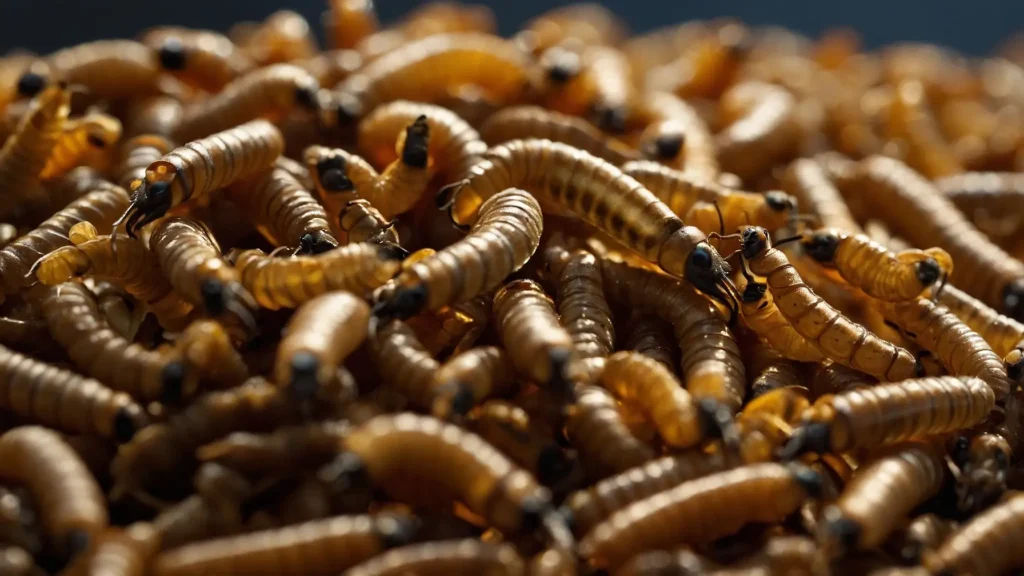Can dogs eat mealworms?

In the vast and diverse world of pet nutrition, dog owners are constantly exploring new foods to enrich their furry friends’ diets. Among the myriad options, one question that often arises is “Can dogs eat mealworms?”, a popular protein source for various pets, and whether they are suitable for dogs. Mealworms, the larval form of the mealworm beetle, Tenebrio molitor, are known for their high protein content and have been used in feeding birds, reptiles, and even humans. As a dedicated dog owner and experienced blogger, I’ve delved into the topic to offer comprehensive insights on the suitability of mealworms for dogs. This discussion aims to provide a balanced view, highlighting the potential benefits and risks, to help fellow dog owners make informed dietary choices for their beloved companions.
Is Mealworms Good for Dogs?
Mealworms can be a nutritious addition to a dog’s diet when introduced properly and in moderation. They are packed with protein, which is essential for dogs’ muscle development and energy levels. Protein is a critical component of every dog’s diet, supporting everything from muscle maintenance to the health of their skin and coat. In addition to protein, mealworms contain valuable fatty acids, which can promote healthy skin and a shiny coat. They are also a source of vitamins and minerals such as B vitamins, which play a crucial role in energy metabolism, and minerals like zinc and iron, which are vital for immune function and oxygen transport, respectively.
Furthermore, the texture of mealworms can provide an interesting sensory experience for dogs, potentially stimulating their appetite and offering a change from their regular diet. For dogs that are picky eaters or require a high-protein diet, such as active breeds or those recovering from illness, mealworms can serve as an appealing supplement.
However, it’s important to introduce mealworms into a dog’s diet gradually and ensure they are sourced from reputable suppliers to avoid any contaminants. Also, considering mealworms as a supplement rather than a primary food source is crucial since dogs require a balanced diet tailored to their specific health needs and lifestyle.
Is Mealworms Bad for Dogs?
While mealworms can offer nutritional benefits to dogs, there are also potential downsides to consider. One of the main concerns is the risk of allergies. Just like humans, dogs can be allergic to anything, including mealworms. Introducing mealworms to a dog’s diet should be done cautiously, with close monitoring for any signs of allergic reactions, such as itching, gastrointestinal upset, or respiratory issues.

Another issue to consider is the fat content in mealworms. While they are a good protein source, mealworms are also relatively high in fat, which can be problematic for overweight dogs or those with a history of pancreatitis. In such cases, mealworms might contribute to weight gain or exacerbate existing health conditions, emphasizing the need for moderation and veterinary guidance when incorporating them into a dog’s diet.
Additionally, the risk of contamination is a concern. Mealworms must be sourced from safe, reliable suppliers to minimize the risk of exposure to pesticides or other harmful substances that could be detrimental to a dog’s health. It’s also essential to ensure that mealworms are prepared correctly, avoiding any seasonings or additives that could be harmful to dogs.
Final Thoughts
In conclusion, can dogs eat mealworms? Yes, mealworms can be a beneficial supplement to a dog’s diet, offering high-quality protein and other nutrients that support overall health. However, like any dietary addition, they should be introduced cautiously and in moderation, considering the dog’s overall health, dietary needs, and potential allergies. Consulting with a veterinarian before making significant changes to your dog’s diet, including the introduction of mealworms, is always recommended to ensure that the new food is safe and appropriate for their individual health status.
Ultimately, the decision to include mealworms in a dog’s diet, answering the question “can dogs eat mealworms,” should be based on a comprehensive understanding of the benefits and potential risks. By doing so, dog owners can make informed choices that enhance their pets’ well-being and vitality. As we continue to explore the vast world of canine nutrition, it’s important to approach new foods with curiosity, caution, and care, ensuring our furry friends lead happy, healthy lives.










